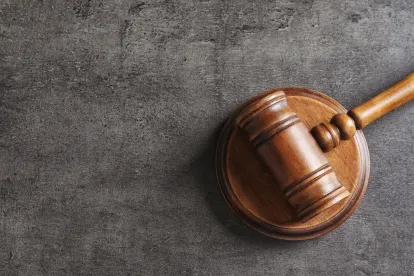Confusion continues amongst federal district courts in the wake of Barr v. American Association of Political Consultants, Inc. (“AAPC”), 140 S. Ct. 2335 (2020), the Supreme Court decision that held the TCPA’s government-debt exception—instituted via a 2015 amendment to the statute—violated the First Amendment. Courts recently have dealt with the issue of whether plaintiffs can bring TCPA claims for conduct occurring between 2015 and July 2020, the date the unconstitutional amendment was passed and the date the Supreme Court declared the amendment unconstitutional and ordered it severed from the TCPA. The Eastern District of Louisiana said the answer to this question is no. Creasy v. Charter Communications, Inc., 2020 WL 5761117 (E.D. La. Sept. 28, 2020). The district courts for the Southern District of California and the Northern District of Ohio disagree, as we discuss below. Our prior posts on this issue, which we have been following closely, can be found here.
In McCurley et al. v. Royal Sea Cruises, Inc., 2021 WL 288164 (S.D. Cal. Jan. 28, 2021), and Less v. Quest Diagnostics Incorporated, 2021 WL 266548 (N.D. Ohio Jan. 26, 2021), defendants argued that TCPA claims arising during the above-mentioned time period were barred because the TCPA was entirely unconstitutional during that period. Both the McCurley and the Less courts disagreed, though the two courts differed in their rationales.
The two courts noted that a majority in AAPC had concluded that the government-debt exception provision was severable from the rest of the statute. The Less court framed the issue as whether severability of the unconstitutional provision should be retroactive to conduct occurring between 2015 and 2020. Less, 2021 WL 266548, at *1. It noted that “‘an unconstitutional statutory amendment is a nullity and void when enacted, and for that reason has no effect on the original statute.’” Less, 2021 WL 266548, at *1 (quoting AAPC, 140 S. Ct. at 2353 (internal quotation marks omitted)). The Less court concluded that since the 2015 amendment was void at its inception, it had “no effect on the pre-2015 text of the statute,” and thus because there “are not constitutional defects to the pre-2015 text, the statute’s enforceability is unaffected by the amendment.” Less, 2021 WL 266548, at *1. Accordingly, the court concluded that there was no constitutional defect in Plaintiff’s claim even though the claim arose during the 2015-2020 time period. Id.
The McCurley court reached the same conclusion, but offered slightly different reasoning. It explained that “‘[s]ix members of the [Supreme Court] . . . conclude[d] that Congress ha[d] impermissibly favored debt-collection speech over political and other speech in violation of the First Amendment’” and “‘[s]even Members of the Court conclude[d] that the entire 1991 robocall restriction should not be invalidated, but rather that the 2015 government-debt exception must be invalidated and severed from the remainder of the statute.’” McCurley, 2021 WL 288164, at *2 (quoting AAPC, 140 S. Ct. at 2343). The McCurley court noted that Justice Kavanaugh—who had voted that the amendment violated the First Amendment and should be severed from the rest of the TCPA—explicitly stated that the Court’s decision “does not negate the liability of parties who made robocalls covered by the robocall restriction.” Id. (quoting AAPC, 140 S. Ct. at 2355 n.12). The McCurley court reasoned that because plaintiff’s case did not involve the collection of government debt, Justice Kavanaugh’s words were directly applicable such that the TCPA applied to the alleged conduct even though it occurred between 2015 and 2020. Id. at *2, *4.
The McCurley court rejected defendant’s contention that Justice Kavanaugh’s opinion should be ignored as dicta. The court noted the rule that where there is a plurality opinion of the Supreme Court, “‘the holding of the Court may be viewed as that position taken by those Members who concurred in the judgments on the narrowest grounds,’” and that “‘when an opinion issues for the [Supreme] Court, it is not only the result but also those portions of the opinion necessary to that result by which [courts] are bound.’” Id. (quoting Marks v. United States, 430 U.S. 188, 193 (1977) and Seminole Tribe of Florida v. Florida, 517 U.S. 44, 67 (1996)). The McCurley court stated that “one single rationale explain[ed] the result joined by seven of the Justices,” namely that “[a]ll seven agree that the 2015 amendment should be severed and the liability of the parties making robocalls who were not collecting a government debt is not negated.” Id. The McCurley court thus seemingly reasoned that because those justices joined Kavanaugh regarding severability, they joined him in his brief allusions to retroactivity.
Accordingly, the McCurley court reasoned that Justice Kavanaugh’s statement applied. Id. at *3. In concluding, the court stated that even if Justice Kavanaugh’s statement was dicta, the statement “signals the intent of the Supreme Court and what it would hold in future cases and, as such, may not be cavalierly dismissed by a district court.” Id.
Thus, whether framed through the lens of retroactivity or by using the rule regarding lower courts’ interpretational duties in parsing Supreme Court plurality opinions, some district courts appear to be hesitant to hold that the TCPA was void from 2015 until the Supreme Court’s ruling in AAPC.





 />i
/>i
